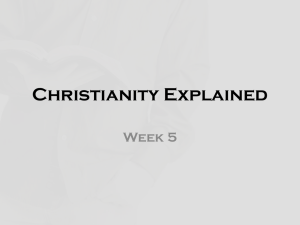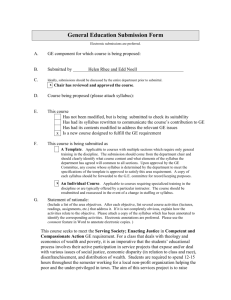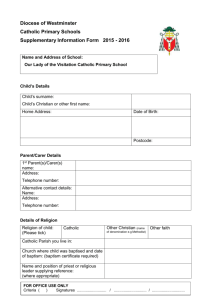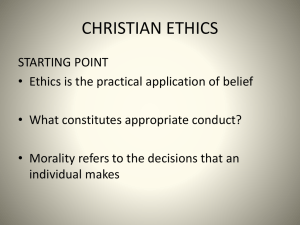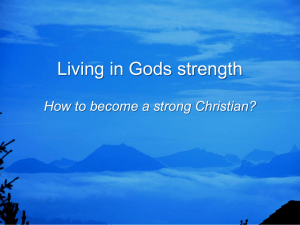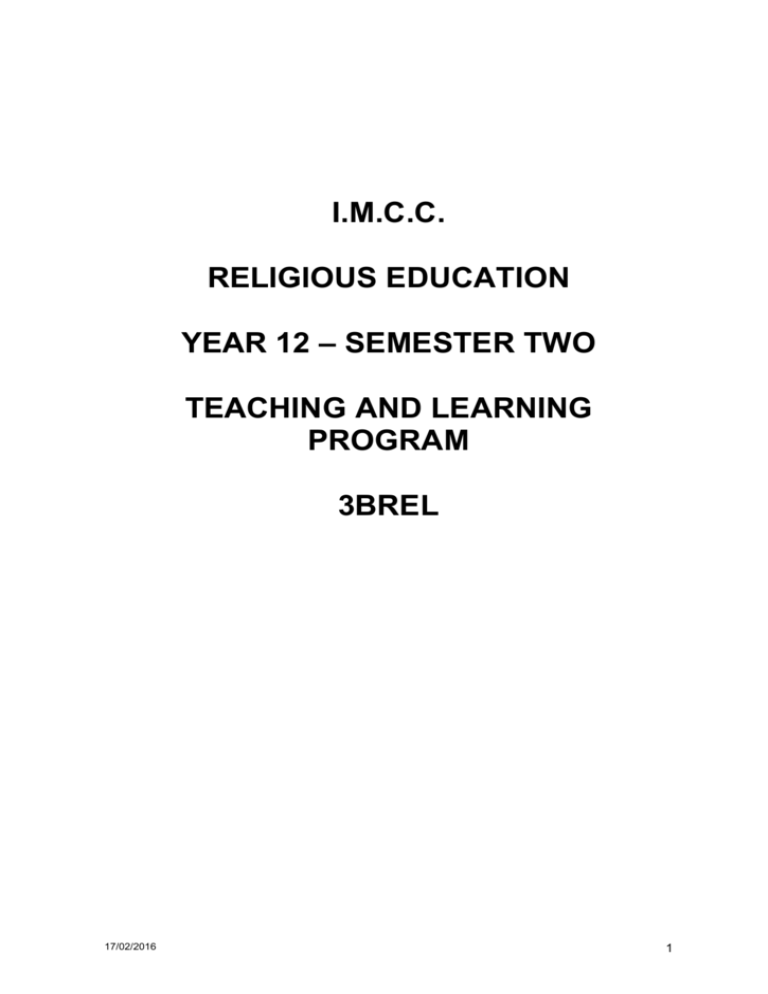
I.M.C.C.
RELIGIOUS EDUCATION
YEAR 12 – SEMESTER TWO
TEACHING AND LEARNING
PROGRAM
3BREL
17/02/2016
1
RELIGION AND LIFE
UNIT 3BREL
Unit description
The focus for this unit is freedom and religion. This unit explores the human desire to become
responsible and free. It also examines religious notions of freedom and how religion responds to
issues that arise from the human desire for freedom.
The range of ideas, values and attitudes that exist in society concerning freedom are examined by
exploring possible sources of influence on people and how they live within societies, particularly in
Australian society. The unit also analyses and assesses the development and consequences of
social trends, and the effects these trends may have on people and their desire to be free.
The factors that can constrain choices for people are investigated. Students also explore the moral
ideas and values that are generally accepted in society today, and the consequences of these
ideas for societies and the lives of individuals. The unit examines religious responses to issues and
events in the past and present, and how such responses impact on people and their experience of
freedom.
Suggested Timing for the teaching of this unit
Chapter
1
2
3
4
5
Time allocation
2 weeks
3 weeks
2 weeks
3 weeks
3 weeks
Considerations
Assessment Task One – Analysis
Assessment Task Two – Exposition
Assessment Task Three – Investigation
Assessment Task Four – Examination
Assessment Profile
Weighting
25%
Type of assessment
Analysis
20%
Exposition
25%
Investigation
30%
Examination
17/02/2016
Task
Discuss from the perspective of one religion how consumerism
impacts on people and their desire for freedom in society.
Support your response with evidence from the source.
Explain the meaning of freedom from the perspective of one
religion.
Investigate how the experience of pilgrimage supports and
fosters reflection, re-evaluation and new insights.
Semester Two Examination
2
I.M.C.C. RELIGIOUS EDUCATION
YEAR 12 – SEMESTER TWO
Unit Learning Context
This unit explores the human desire to become responsible and free.
Within the broad area of freedom and religion the following contexts will be developed:
freedom and the individual
freedom, religion and ethics
freedom in the 21st century
pathways to freedom
Catholic Content
The Catholic content will be presented in the following order:
Freedom and responsibility
The Christian vision of freedom
Guidance for living the vision
Expressions of the Christian vision of freedom
Free and responsible
Recommended references
Catechism of the Catholic Church/Compendium of the Catechism of the Catholic Church
Elliot, P J ed. (2006) Catholic Studies for Senior Secondary Students JGH Publications,
Melbourne
Morrissey, J et al. (2005) Living Religion 3rd edition Pearson Longman, Melbourne
Kiddey, P & Waring, F (2001) Success For All Selecting Appropriate Learning Strategies
Curriculum Corporation, Victoria
Note
Scaffolding may be required to support student use of text as well as to direct their attention to what
is most relevant. For instance:
Key words may need to be defined or clarified
Background, contextual information may be required
The text may need to be broken up into smaller sections and linked to comprehension
questions before exploring the meaning of ideas contained in the text
Some text may need to be simplified or summarised
17/02/2016
3
YEAR 12 SEMESTER TWO: 3BREL
MODULE FOUR: The Christian vision of life
The nature of religion
The search for meaning
variety of ways in which people pursue meaning and purpose in their lives through their
spirituality and expressions of religion
ways people develop their personal ideals and the circumstances that shape their search for
meaning.
Religious belief systems
understanding freedom and its expression from a religious perspective.
Religious practices and structures
structures and processes provided by religion in response to the search for freedom e.g. ritual
cleansing, rites of passage, religious schools.
The influence of religion
The place of religion in society
analysis of the interplay between individual, societal and religious views on the moral
implications of issues e.g. overpopulation, global economy, pacifism
ways this interplay shapes the way religion is perceived and understood in society.
Religion in historical and cultural contexts
the impact and significance of the search for freedom on the development of religion.
Contemporary issues for religion
analysis of the impact contemporary trends have upon religion.
Religious inquiry and processes
Investigative processes and research skills
how to construct research questions and/or a hypothesis
techniques for interrogating sources for different interpretations and view
how to ethically locate, identify and justify the selection of sources relevant to an investigation
methods for collecting and recording data that identifies appropriate content that begins with the
general and is narrowed to the specific.
Interpreting, analysing and synthesising information
techniques for identifying patterns trends and representations in evidence
techniques for describing and analysing the collected evidence for silences, gaps, motives,
misconceptions and different perspectives
techniques to evaluate the extent of supporting evidence
techniques for drawing conclusions from supporting or conflicting evidence.
Forms of communication that present findings and conclusions
how to represent clear and coherent understandings whilst being aware of the tentative nature
of findings in a range of communication styles
techniques for acknowledging intellectual property and copyright ownership by citing origins of
sources when using in text citations, quotations or footnotes
methods of reviewing and editing work in response to different audiences.
17/02/2016
4
SENIOR SECONDARY RELIGIOUS EDUCATION
CHAPTER ONE
YEAR 12 – SEMESTER TWO 3BREL
FREEDOM AND RESPONSIBILITY
(2 Weeks)
KU 1: Everyone desires genuine freedom
Freedom is a basic human yearning
Human freedom was created by God
Is freedom important?
LEARNING AND TEACHING PROGRAM
SYLLABUS CONTENT
Note
When designing classroom
learning teachers are
responsible for providing
opportunities for students to
learn, practice and develop
specific Religious Inquiry
and Process skills as set
out in the syllabus. These
are summarised below:
Investigative processes
and research skills
Interpreting, analysing
and synthesising
information
Forms of communication
that present findings and
conclusions
SUGGESTED LEARNING ACTIVITIES
RESOURCES
Introduction
Provide students with copies of:
REL3B syllabus
Unit outline
Assessment outline
With reference to these documents consider what
the unit is about and the requirements of the
assessment program:
What is this unit about?
Introduce the concept of freedom by viewing short
video clips or read texts of great freedom
speeches and note religious references, e.g.
o
M L King’s final speech (before his
assassination)
http://www.youtube.com/watch?v=x1L8yMX3pg&feature=related
o
or M L King’s “I have a dream” speech
http://www.youtube.com/watch?v=gZLvSnr
6s50
o
Nelson Mandela’s inauguration speech
(Refer to Resource Sheet 1)
Review the design brief for the Stage 3 WACE
Exam (to be found at the back of the course
document) – revisit issues and ideas about
preparation for the exam.
An examination tips sheet from the Curriculum
Council website could also be given out
http://www.curriculum.wa.edu.au/internet
/_Documents/Policy/Examination+tips+updated.do
c
http://www.youtube.com/
watch?v=x1L8yMX3pg&feature=related
http://www.youtube.com/
watch?v=gZLvSnr6s50
12REL3B(RS1)
http://www.curriculum.
wa.edu.au/ internet
/_Documents/
Policy/Examination
+tips+updated.doc
Questions for Key Understanding 1
With reference to Chapter 1 complete the following:
What evidence is there that people search for
meaning?
What are some of the major influences on people
in their search for meaning and purpose?
Why is freedom essential to the search for
meaning?
What is the Catholic understanding of freedom?
What is the Catholic understanding of personal
mystery?
How might these understandings find expression
in the lives of people?
17/02/2016
5
SENIOR SECONDARY RELIGIOUS EDUCATION
CHAPTER ONE
YEAR 12 – SEMESTER TWO 3BREL
FREEDOM AND RESPONSIBILITY
(2 Weeks)
KU 1: Everyone desires genuine freedom
Freedom is a basic human yearning
Human freedom was created by God
Is freedom important?
LEARNING AND TEACHING PROGRAM
SYLLABUS CONTENT
analysis of the impact
contemporary trends
have upon religion.
Investigative processes
and research skills
Interpreting, analysing
and synthesising
information
Forms of communication
that present findings and
conclusions
SUGGESTED LEARNING ACTIVITIES
Task
Explore a range of factors that influence freedom
and decision making in contemporary society:
1. Complete LAS 1: I want to be free
2. Complete one of the following
LAS 2: Lily Allen ‘The Fear’
LAS 3: The influence of the media
Watch a segment of a program such as the
Gruen Transfer and identify some of the
techniques used to influence choices.
Brainstorm and discuss other examples of
pressure and/or persuasion.
Identify advertisements that could have a
powerful influence over people. What devices
of persuasion are used? In what way could
people be manipulated? Share ideas on which
recent television or magazine commercial had
the most impact and why..
RESOURCES
12REL3B(LAS1)
12REL3B(LAS2)
12REL3B(LAS3)
3. Working in small discussion groups, examine
the ideas and values being given to people in
society regarding:
drugs and alcohol
family
religion
employment
relationships and sexuality.
Identify which ideas/values run counter to
Christian values. Name and briefly define each
Christian values. Outline briefly how each
idea/value reflects and/or runs counter to a
particular Christian value.
4. Complete LAS 4: How free are we?
5. Complete LAS 5: The human person
12REL3B(LAS4)
12REL3B(LAS5)
6. Construct a suitable diagram and/or picture to
summarise and illustrate the dynamic way that
people grow in self-awareness under the
influence of a range of internal and external
factors. Consider:
What impact do these factors have on the
ability of people to be free?
How does the human yearning for freedom
find expression in contemporary society?
17/02/2016
6
YEAR 12 – SEMESTER TWO 3BREL
SENIOR SECONDARY RELIGIOUS EDUCATION
CHAPTER ONE
FREEDOM AND RESPONSIBILITY
(2 Weeks)
KU 1: Everyone desires genuine freedom
Freedom is a basic human yearning
Human freedom was created by God
Is freedom important?
LEARNING AND TEACHING PROGRAM
SYLLABUS CONTENT
variety of ways in which
people pursue meaning
and purpose in their lives
through their spirituality
and expressions of
religion
ways people develop
their personal ideals and
the circumstances that
shape their search for
meaning.
Investigative processes
and research skills
Interpreting, analysing
and synthesising
information
Forms of communication
that present findings and
conclusions
SUGGESTED LEARNING ACTIVITIES
RESOURCES
Investigation
Research stories of individuals who have yearned to
be free, recognised personal mystery and, in many
cases, faced restrictions on freedom.
(Refer to Resource Sheet 2 for a list of stories
appearing in Australian Catholics magazine. Other
stories should be accessed such as stories from
students own reading or video clips from such
sources as Australian Story on ABCTV etc.)
12REL3B(RS2)
Locate a range of examples that illustrate the
following:
1. The variety of ways in which people pursue
meaning and purpose in their lives through
expressions of religion
2. Ways people develop their personal ideals
3. Circumstances that shape their search for
meaning, particularly as they relate to issues of
freedom
OR
How do the stories of the people reviewed illustrate
the following:
1. Different ways in which people pursue meaning
and purpose in their lives
2. How each expresses their spirituality and
religious beliefs in different ways
3. How people develop their personal ideals
4. The circumstances that shape their search for
meaning
5. The role freedom has played in the search for
meaning
17/02/2016
7
SENIOR SECONDARY RELIGIOUS EDUCATION
CHAPTER TWO
YEAR 12 – SEMESTER TWO 3BREL
THE CHRISTIAN VISION OF FREEDOM
(2 Weeks)
KU 2: For Christians Jesus is the source of true freedom
Christians understand that following Jesus is challenging
What does the Catholic faith Tradition say about freedom?
LEARNING AND TEACHING PROGRAM
SYLLABUS CONTENT
analysis of the impact
contemporary trends
have upon religion.
Investigative processes
and research skills
Interpreting, analysing
and synthesising
information
Forms of communication
that present findings and
conclusions
17/02/2016
SUGGESTED LEARNING ACTIVITIES
RESOURCES
Questions for Key Understanding 2.1
With reference to Chapter 2.1 complete the
following:
1. Why is following Jesus challenging?
Complete LAS 6: Contemporary Trends
12REL3B(LAS6)
Sample Assessment One: Analysis
How significant is the impact of consumerism upon
society and religion?
Task
1. Read RS 3: Consuming Religion
2. Summarise the main points made by the author
about Miller’s analysis of contemporary society
3. Analyse the question and identify the key
components that need answer in your essay
4. Complete the essay.
12REL3B(RS3)
8
SENIOR SECONDARY RELIGIOUS EDUCATION
CHAPTER TWO
YEAR 12 – SEMESTER TWO 3BREL
THE CHRISTIAN VISION OF FREEDOM
(2 Weeks)
KU 2: For Christians Jesus is the source of true freedom
Christians believe that the truth offered by Jesus sets people free
What does the Catholic faith Tradition say about freedom?
LEARNING AND TEACHING PROGRAM
SYLLABUS CONTENT
understanding freedom
and its expression from a
religious perspective.
Investigative processes
and research skills
Interpreting, analysing
and synthesising
information
Forms of communication
that present findings and
conclusions
17/02/2016
SUGGESTED LEARNING ACTIVITIES
RESOURCES
Questions for Key Understanding 2.2
With reference to Chapter 2.2 complete the
following:
1. What vision for life does Jesus teach and how
can this message lead people to freedom?
2. Why is Jesus essential to the Christian vision for
life and true freedom?
3. What is the meaning of Christian hope?
Task
What are some examples of people who have given
expression to this vision?
Compare the two versions of "Do It Anyway"
located at:
http://www.prayerfoundation.org/
mother_teresa_do_it_anyway.htm
Discuss how the message conveyed in either
version relates to the content presented in the
SR 2.2
Complete LAS 7: Father Damien
Complete LAS 8: A variety of responses from
the saints
http://www.prayer
foundation.org/
mother_teresa
_do_it_anyway.htm
12REL3B(LAS7)
12REL3B(LAS8)
9
SENIOR SECONDARY RELIGIOUS EDUCATION
CHAPTER TWO
YEAR 12 – SEMESTER TWO 3BREL
THE CHRISTIAN VISION OF FREEDOM
(2 Weeks)
KU 2: For Christians Jesus is the source of true freedom
Through the life, death and resurrection of Jesus all people become free
What does the Catholic faith Tradition say about freedom?
LEARNING AND TEACHING PROGRAM
SYLLABUS CONTENT
understanding freedom
and its expression from a
religious perspective.
Investigative processes
and research skills
Interpreting, analysing
and synthesising
information
Forms of communication
that present findings and
conclusions
17/02/2016
SUGGESTED LEARNING ACTIVITIES
RESOURCES
Questions for Key Understanding 2.3
With reference to Chapter 2.3 complete the
following:
1. Why is knowledge of the biblical tradition
important for understanding Jesus?
2. How do the life, death and resurrection of Jesus
bring about freedom for all people?
Complete a selection of the following activities:
1. Define freedom
2. Using a resource such as A Dictionary for
Catholics by Laurie Woods define the following
list of terms and discuss how these terms relate
to freedom: Salvation, Redemption, Grace
3. Complete the document study in LAS 9: Law as
a guide to freedom
4. Explain the meaning of ‘Paschal mystery’
12REL3B(LAS9)
10
SENIOR SECONDARY RELIGIOUS EDUCATION
CHAPTER TWO
YEAR 12 – SEMESTER TWO 3BREL
THE CHRISTIAN VISION OF FREEDOM
(2 Weeks)
KU 2: For Christians Jesus is the source of true freedom
Through the life, death and resurrection of Jesus all people become free
What does the Catholic faith Tradition say about freedom?
LEARNING AND TEACHING PROGRAM
SYLLABUS CONTENT
understanding freedom
and its expression from a
religious perspective.
Investigative processes
and research skills
Interpreting, analysing
and synthesising
information
Forms of communication
that present findings and
conclusions
SUGGESTED LEARNING ACTIVITIES
RESOURCES
Sample Assessment Two: Exposition
Explain the meaning of freedom from the
perspective of one religion.
Task
Consider the following:
God created man a rational being,
conferring on him the dignity of a person
who can initiate and control his own actions.
"God willed that man should be 'left in the
hand of his own counsel,' so that he might of
his own accord seek his Creator and freely
attain his full and blessed perfection by
cleaving to him."
Man is rational and therefore like God; he is
created with free will and is master over his
acts.
CCC: ARTICLE 3 MAN'S FREEDOM 1730
Only when a person surrenders fully to God can
they discover true freedom. Why might some people
view this as a paradox? Why is this understanding of
freedom meaningful for the Christian person?
Write an in-class essay on the following:
Explain the meaning of freedom from the
perspective of one religion.
17/02/2016
11
SENIOR SECONDARY RELIGIOUS EDUCATION
CHAPTER TWO
YEAR 12 – SEMESTER TWO 3BREL
THE CHRISTIAN VISION OF FREEDOM
(2 Weeks)
KU 2: For Christians Jesus is the source of true freedom
Through the sacraments of initiation especially the Eucharist people are strengthened to become free
What does the Catholic faith Tradition say about freedom?
LEARNING AND TEACHING PROGRAM
SYLLABUS CONTENT
variety of ways in which
people pursue meaning
and purpose in their lives
through their spirituality
and expressions of
religion
ways people develop
their personal ideals and
the circumstances that
shape their search for
meaning.
structures and processes
provided by religion in
response to the search
for freedom e.g. ritual
cleansing, rites of
passage, religious
schools.
Investigative processes
and research skills
Interpreting, analysing
and synthesising
information
Forms of communication
that present findings and
conclusions
SUGGESTED LEARNING ACTIVITIES
RESOURCES
Questions for Key Understanding 2.4
With reference to Chapter 2.4 complete the
following:
1. How does the Eucharist enable the Christian
community to experience the saving work of
Jesus?
Document study
The following document study is presented as a
basic resource that should be adapted and changed
by teachers to support the learning of students. It
provides a broad range of content that relates to this
learning point as well as the overall learning of this
unit of Religion and Life. It also requires students to
draw upon and practice essential skills of analysis
and synthesis.
Read each of the following sources
1. When lives are changed by God: stories of
growing faith
http://www.ncls.org.au/default.aspx?sitemapid=3164
2. Young people and faith
http://jmm.aaa.net.au/articles/15310.htm
3. What does it mean to be a spiritual Catholic?
http://www.olgc.com.au/Documents/Deepdene2.doc
4. Chapter 8: Biblical Origins of the Eucharist from
Living Biblically by Archbishop Barry Hickey pp.
59 – 64
http://www.ncls.org.au/
default.aspx?
sitemapid=3164
http://jmm.aaa.net.au
/articles/15310.htm
http://www.olgc.com.au
/Documents/
Deepdene2.doc
Discuss the Catholic understanding of how ongoing
participation in Eucharist supports people in their
search for meaning and purpose. Refer to the main
ideas and issues presented in the sources provided.
17/02/2016
12
YEAR 12 – SEMESTER TWO 3BREL
SENIOR SECONDARY RELIGIOUS EDUCATION
CHAPTER THREE
GUIDANCE FOR LIVING THE VISION
(2 Weeks)
KU 3: God offers people guidance for living the Christian vision
Christians grow in personal freedom by living the Beatitudes
What guidance does the Catholic faith Tradition offer for living the Christian vision of freedom?
LEARNING AND TEACHING PROGRAM
SYLLABUS CONTENT
understanding freedom
and its expression from
a religious perspective.
Investigative processes
and research skills
Interpreting, analysing
and synthesising
information
Forms of communication
that present findings and
conclusions
SUGGESTED LEARNING ACTIVITIES
RESOURCES
Questions for Key Understanding 3.1
What are some important religious beliefs that are
offered in response to people’s search for freedom?
What is the Christian definition and understanding
of freedom?
Why is Jesus central to the Christian
understanding of true freedom?
How do the Beatitudes summarise the meaning of
freedom from a Christian perspective?
Task
Introduce a study of the Beatitudes by examining
the following Scripture passages to see how Jesus
brought freedom to others:
Matthew 8:1–4; 9:27–31; 9:32–34
Mark 10:46–52
Luke 5:18–26
John 4:1–30.
For each story, write a summary of how each
person’s freedom was affected and how Jesus
brought them freedom.
Extension
As a class, examine the life-goals of characters in
literature or media students are studying. Evaluate
how authentic these hopes are for each character
by looking at the character’s qualities, talents and
skills.
Activities
Explore the details and meaning of the Beatitudes
by completing a selection of the following activities:
1. Define ‘beatitude’.
2.
Read Matthew 5:1–12 and list the Beatitudes
and the experience of God that each can bring.
Consider the following:
What do the Beatitudes mean for people
today?
What evil in society do the Beatitudes
challenge?
What are some advantages and drawbacks
associated with the Beatitudes?
OR
17/02/2016
13
YEAR 12 – SEMESTER TWO 3BREL
SENIOR SECONDARY RELIGIOUS EDUCATION
CHAPTER THREE
GUIDANCE FOR LIVING THE VISION
(2 Weeks)
KU 3: God offers people guidance for living the Christian vision
Christians grow in personal freedom by living the Beatitudes
What guidance does the Catholic faith Tradition offer for living the Christian vision of freedom?
LEARNING AND TEACHING PROGRAM
SYLLABUS CONTENT
understanding freedom
and its expression from
a religious perspective.
SUGGESTED LEARNING ACTIVITIES
OR
2.
Investigative processes
and research skills
Interpreting, analysing
and synthesising
information
Forms of communication
that present findings and
conclusions
RESOURCES
As a class, recall the Ten Commandments.
When they are listed, link each Beatitude with
the Commandment/s which God gave to protect
that value. Then identify which Commandment
protects against each inner pressure. Which
Commandments would be most difficult for a
person to live in today’s society?
OR
2.
Write a brief explanation of the two meanings of
kingdom of Heaven in the Beatitudes. Read the
parables of the kingdom in Matthew 13:31–33
and 44–52 and, choosing one of the parables,
draw a picture or symbol of it to depict the
meaning of the kingdom of Heaven. Pictures or
symbols are shared as a class.
3.
Read the whole of Psalm 38 and make a list of
the qualities of the ‘gentle’ person as described
by the psalmist. Next to each quality, make a
note of the opposite qualities that may be see in
society today. What is meant by showing mercy
to others?
OR
3.
From the list of Beatitudes, choose a favourite
and identify the reasons for this choice. Which
do you think would be the most difficult
Beatitude to live? Why? Which Beatitude might
be most relevant to people in society today?
Why?
4.
Write a one-page explanation of how the
Beatitudes can offer greater freedom, both to
believers and nonbelievers.
12REL3B(LAS10)
OR
4.
Explain how personal freedom can grow as
people seek to live each ‘beatitude’. How can
Christians today promote ‘beatitude’?
Exposition
Complete the activities in LAS 10: An Upside-Down
Kingdom
17/02/2016
14
SENIOR SECONDARY RELIGIOUS EDUCATION
CHAPTER THREE
YEAR 12 – SEMESTER TWO 3BREL
GUIDANCE FOR LIVING THE VISION
(2 Weeks)
KU 3: God offers people guidance for living the Christian vision
The Eighth Commandment calls people to live the truth of Jesus which sets people free
What guidance does the Catholic faith Tradition offer for living the Christian vision of freedom?
LEARNING AND TEACHING PROGRAM
SYLLABUS CONTENT
understanding freedom
and its expression from a
religious perspective.
Investigative processes
and research skills
Interpreting, analysing
and synthesising
information
Forms of communication
that present findings and
conclusions
SUGGESTED LEARNING ACTIVITIES
RESOURCES
Activities for Key Understanding 3.2
1. After reading Chapter 3.2 prepare an
advertising campaign to promote truthfulness in
society. As Part of your campaign identify the
following:
Why truthfulness is important
Habits and attitudes that make being honest
and truthful difficult
Examples from contemporary society that
show people living the Eighth commandment
and people not living the Eighth
commandment
How does living the truth of Jesus set people
free
2. Read How does Christian truth bring freedom?
Identify what this document states about how
the truth sets people free.
http://www.helium.com/items/1772699-jesus-truthsalvation-truth-freedom
17/02/2016
http://www.helium.com/
items/1772699-jesus-truthsalvation-truth-freedom
15
SENIOR SECONDARY RELIGIOUS EDUCATION
CHAPTER FOUR
YEAR 12 – SEMESTER TWO 3BREL
EXPRESSIONS OF THE CHRISTIAN VISION OF FREEDOM
(3 Weeks)
KU 4: Christians journey towards the freedom Christ promised
Christians recognise that the Church and all who follow Jesus are on a pilgrimage
How does the Christian vision of freedom find expression in the lives of people?
LEARNING AND TEACHING PROGRAM
SYLLABUS CONTENT
structures and processes
provided by religion in
response to the search
for freedom e.g. ritual
cleansing, rites of
passage, religious
schools.
Investigative processes
and research skills
Interpreting, analysing
and synthesising
information
Forms of communication
that present findings and
conclusions
17/02/2016
SUGGESTED LEARNING ACTIVITIES
RESOURCES
Activities for Key Understanding 4.1
After reading Chapter 4.1:
1. Briefly explain each of the following statements:
Jesus came to call sinners
Jesus chose followers who were not perfect
The Pentecost experience
The Church of strugglers
The promise of Jesus
2. Explain the following – the Church and all who
follow Jesus are on a pilgrimage
Task
Complete a selection of the following activities:
1. Explain what a ‘pilgrimage’ is. How can the
word ‘pilgrimage’ be applied to the journey of
members of the Church?
2.
Invite (or investigate) a person who has felt
called to show concern for other members of
Christ’s Church to share their story. The person
could be involved in the RCIA programme,
youth activities, St Vincent de Paul or Legion of
Mary, missionary work or care for the sick or
disabled. The person could share their journey,
how they knew they were called to that
particular work, how they put that call into
action, and what rewards the work has brought
them. How would they describe their life and
work as a pilgrimage.
3.
Reflect on the pilgrimage of God’s people as
recalled in the Old Testament by reading
Chapter 4.1 and noting down the Biblical
sources referred to in this text.
4.
Read Resource Sheet 4 Pilgrimage in the Bible
and recognise the importance of the Exodus
event in the life of God’s people.
5.
Inquire into the three Jewish festivals referred
to (i.e. Passover, Weeks and Tabernacles) and
the significance of these both as reminders of
the Exodus pilgrimage from slavery to the Holy
Land and as a religious pilgrimage to the
Temple. Pose two focus questions:
How does this festival/do these festivals recall
and make present the Exodus event for the
Jewish people?
What new insights on the Exodus event does
this information supply for you?
12REL3B(RS4)
16
SENIOR SECONDARY RELIGIOUS EDUCATION
CHAPTER FOUR
YEAR 12 – SEMESTER TWO 3BREL
EXPRESSIONS OF THE CHRISTIAN VISION OF FREEDOM
(3 Weeks)
KU 4: Christians journey towards the freedom Christ promised
Christians recognise that the Church and all who follow Jesus are on a pilgrimage
How does the Christian vision of freedom find expression in the lives of people?
LEARNING AND TEACHING PROGRAM
SYLLABUS CONTENT
structures and processes
provided by religion in
response to the search
for freedom e.g. ritual
cleansing, rites of
passage, religious
schools.
SUGGESTED LEARNING ACTIVITIES
Investigation: Pilgrimage
Investigate how the experience of pilgrimage
supports and fosters reflection, re-evaluation and
new insights.
Tune into this investigation by reviewing a resource
such as Pilgrimage: The journey within and beyond
http://bne.catholic.net.au/data/portal/00005057/
0000/005/121/content/74505001190164895109.pdf
Investigative processes
and research skills
Interpreting, analysing
and synthesising
information
Forms of communication
that present findings and
conclusions
RESOURCES
http://bne.catholic.net.au/
data/portal/00005057/
0000/005/121/content/
74505001190164895109.pdf
Discuss the meaning of key words in the syllabus.
For each generate a list of synonyms, for example:
Structure: arrangement, organization,
construction, configuration, make-up,
constitution, formation, composition
Process: procedure, course, development,
progression, method, route, practice, course
of action
Develop an investigation that addresses the
following research question:
How can an understanding and experience of
pilgrimage support people in their search for
freedom?
What is a pilgrimage?
What are the origins of Christian pilgrimage?
How has Christian pilgrimage found expression
in the past?
How does Christian pilgrimage find expression
today?
How is a pilgrimage a structure and/or process
provided by religion?
What are some of the main features
(structures/processes) of Christian pilgrimage?
How does Christian pilgrimage respond to
people and their search for freedom?
What opportunities and challenges do
pilgrimages present to people in their search for
freedom today?
17/02/2016
17
SENIOR SECONDARY RELIGIOUS EDUCATION
CHAPTER FOUR
YEAR 12 – SEMESTER TWO 3BREL
EXPRESSIONS OF THE CHRISTIAN VISION OF FREEDOM
(3 Weeks)
KU 4: Christians journey towards the freedom Christ promised
In the work and writings of the Apostle Paul, Christians are reminded that they are on a pilgrimage
How does the Christian vision of freedom find expression in the lives of people?
LEARNING AND TEACHING PROGRAM
SYLLABUS CONTENT
variety of ways in which
people pursue meaning
and purpose in their
lives
through
their
spirituality
and
expressions of religion
ways people develop
their personal ideals and
the circumstances that
shape their search for
meaning.
understanding freedom
and its expression from
a religious perspective.
Investigative processes
and research skills
Interpreting, analysing
and synthesising
information
Forms of communication
that present findings and
conclusions
17/02/2016
SUGGESTED LEARNING ACTIVITIES
Task
Watch a 6 minute video summarising the life and
work of St Paul. http://www.yearofstpaul.com/
RESOURCES
http://www.yearofstpaul.com/
Read Chapter 4.2 from the Student Resource and
outline the extent of St Paul’s ministry and existing
writings.
With reference to Chapter 4.2 and after additional
research complete the following:
1. How did the work and theology of Paul
contribute to the development of Christianity?
2. How do the teachings of Paul express and
explain the search for freedom?
Additional resources on Paul
1. RESource website: 1 Thessalonians –
Introducing Paul
http://resource.fraynework.com.au/object.cfm?o
=119&pid=589&showrm=true&uptam=false
2. Getting to know Saint Paul today: A change in
paradigm?
http://www.thinkingfaith.org/articles/20081027_1.htm
http://resource.fraynework.
com.au/object.cfm?o
=119&pid=589&showrm
=true&uptam=false
ttp://www.thinkingfaith.org
/articles/20081027_1.htm
18
YEAR 12 – SEMESTER TWO 3BREL
SENIOR SECONDARY RELIGIOUS EDUCATION
CHAPTER FIVE
FREE AND RESPONSIBLE
(3 Weeks)
KU 5: Catholics today, are called to be free and responsible in how they live
How does the Christian vision of freedom find expression in the lives of people?
LEARNING AND TEACHING PROGRAM
SYLLABUS CONTENT
the impact and
significance of the
search for freedom on
the development of
religion.
understanding freedom
and its expression from a
religious perspective.
Investigative processes
and research skills
Interpreting, analysing
and synthesising
information
Forms of communication
that present findings and
conclusions
Note
Scaffolding may be
required to support student
use of text as well as to
direct their attention to
what is most relevant. For
instance:
Key words may need
to be defined or
clarified
Background,
contextual information
may be required
The text may need to
be broken up into
smaller sections and
linked to
comprehension
questions before
exploring the meaning
of ideas contained in
the text
Some text may need
to be simplified or
summarised
17/02/2016
SUGGESTED LEARNING ACTIVITIES
RESOURCES
Task
Explore ONE of the following:
The development of religious freedom
Examine a range of resources dealing with the
development of religious freedom
The historical development of religious freedom
http://www.religiousfreedom
.com/index.php?option
=com_content&view
=article&id=378&Itemid=18
Religious freedom: Vatican II modernises churchstate ties
http://www.catholicnews
.com/data/stories/cns
/0505798.htm
Overview of the Vatican document Dignitatis
Humanae
http://dignitatis-humanae.co.tv/
http://www.religiousfreedom
.com/index.php?option
=com_content&view
=article&id=378&Itemid
=18
http://www.catholicnews
.com/data/stories/cns
/0505798.htm
http://dignitatis humanae.co.tv/
Respond to the following question:
1. Identify the important steps in the development of
religious freedom
2. Summarise the key features of each step
3. What impact did this particular search for
freedom have upon the development of religion?
OR
Amazing Grace
Choose a particular issue concerning freedom and
investigate its historical context.
Issue: Investigate the struggle to end slavery as
presented in the film Amazing Grace
Focus question: How did the struggle to end
slavery impact upon religion?
As part of your investigation consider the following
questions:
1. What role did the search for freedom play in this
issue?
2. How did this search or desire for freedom impact
upon the issue?
3. How did religion interact with this issue?
4. Why was this issue significant for religion?
5. What impact did this issue have on religion?
19
YEAR 12 – SEMESTER TWO 3BREL
SENIOR SECONDARY RELIGIOUS EDUCATION
CHAPTER FIVE
FREE AND RESPONSIBLE
(3 Weeks)
KU 5: Catholics today, are called to be free and responsible in how they live
For Catholics, the Sacrament of Penance offers people healing and freedom
How does the Christian vision of freedom find expression in the lives of people?
LEARNING AND TEACHING PROGRAM
SYLLABUS CONTENT
understanding freedom
from a religious
perspective
structures and processes
provided by religion in
response to the search
for freedom e.g. ritual
cleansing, rites of
passage, religious
schools.
SUGGESTED LEARNING ACTIVITIES
Task
1. Read and discuss the comments made about
the Sacrament of Penance in the following book
review:
http://www.acu.edu.au/__data/assets/pdf_file/
0006/106674/Book_Review_Frank_OLoughlin.pdf
2.
Research briefly the main points in the history
of the Sacrament of Penance and present these
findings in a timeline format.
3.
Describe the purpose of the three steps in the
Rite of Reconciliation, firstly from a human
relationship point of view then from the aspect
of restoring relationship with God.
Investigative processes
and research skills
Interpreting, analysing
and synthesising
information
Forms of communication
that present findings and
conclusions
RESOURCES
http://www.acu.edu.au/__
data/assets/pdf_file/
0006/106674/Book_Review
_Frank_OLoughlin.pdf
OR
3.
Students invite the parish priest or school
chaplain to outline to them the significance of
the steps in the Rite of Reconciliation and the
key elements of the Sacrament of Penance.
The priest needs to especially explain why the
absolution is an essential part of the Sacrament
of Penance.
Exposition
Describe how the Catholic Sacrament of Penance
provides a process that supports and responds to
people in the search for freedom.
17/02/2016
20
SENIOR SECONDARY RELIGIOUS EDUCATION
CHAPTER FIVE
YEAR 12 – SEMESTER TWO 3BREL
FREE AND RESPONSIBLE
(3 Weeks)
KU 5: Catholics today, are called to be free and responsible in how they live
The Church today preaches the Gospel of life, a vision for living today
What does it mean to be free and responsible in today’s world?
LEARNING AND TEACHING PROGRAM
SYLLABUS CONTENT
analysis of the interplay
between individual,
societal and religious
views on the moral
implications of issues
e.g. overpopulation,
global economy, pacifism
ways this interplay
shapes the way religion is
perceived and
understood in society
Investigative processes
and research skills
Interpreting, analysing
and synthesising
information
Forms of communication
that present findings and
conclusions
SUGGESTED LEARNING ACTIVITIES
Task
1. Read LAS 11: Being People of Life and identify
the author’s point of view
2. Read LAS 12: The Truth About Catholic Social
Teachings and outline what this article suggests
about the Catholic understanding of individuality
and collective responsibility, particularly in terms
of how people should participate within society.
3. Summarise the main points of a condensed
version of the Papal encyclical Evangelium vitae
(Gospel of life).
http://www.americancatholic.org/
Newsletters/CU/ac0995.asp OR
http://www.priestsforlife.org/
magisterium/evvatsummary.htm
4. Explore the Catholic response and action to
many of the issues affecting our world today by
reviewing the information provided about a
range of issues at the following website:
http://www.dow.org.au/seeking/questions-from-life
RESOURCES
12REL3B(LAS11)
12REL3B(LAS12)
http://www.american catholic
.org/Newsletters
/CU/ac0995.asp
http://www.priestsforlife.org/
magisterium/
evvatsummary.htm
http://www.dow.org.au/
seeking/questions-from-life
5. Select one issue and investigate it in terms of
the following:
analyse the interplay between individual,
societal and religious views on the moral
implications of this issues
ways this interplay shapes the way religion is
perceived and understood in society
OR
5. Select two/three issues and investigate each in
terms of the following:
Compare and contrast these issues in terms
of their moral implications from the
perspective of one religion
analysis the interplay that occurs between
individual, societal and religious views on the
moral implications of these issues
develop a synthesis of the ways such interplay
shapes the way religion is perceived and
understood in society
17/02/2016
21




